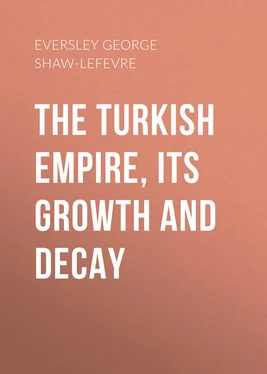George Eversley - The Turkish Empire, its Growth and Decay
Здесь есть возможность читать онлайн «George Eversley - The Turkish Empire, its Growth and Decay» — ознакомительный отрывок электронной книги совершенно бесплатно, а после прочтения отрывка купить полную версию. В некоторых случаях можно слушать аудио, скачать через торрент в формате fb2 и присутствует краткое содержание. Жанр: foreign_antique, foreign_prose, на английском языке. Описание произведения, (предисловие) а так же отзывы посетителей доступны на портале библиотеки ЛибКат.
- Название:The Turkish Empire, its Growth and Decay
- Автор:
- Жанр:
- Год:неизвестен
- ISBN:нет данных
- Рейтинг книги:3 / 5. Голосов: 1
-
Избранное:Добавить в избранное
- Отзывы:
-
Ваша оценка:
- 60
- 1
- 2
- 3
- 4
- 5
The Turkish Empire, its Growth and Decay: краткое содержание, описание и аннотация
Предлагаем к чтению аннотацию, описание, краткое содержание или предисловие (зависит от того, что написал сам автор книги «The Turkish Empire, its Growth and Decay»). Если вы не нашли необходимую информацию о книге — напишите в комментариях, мы постараемся отыскать её.
The Turkish Empire, its Growth and Decay — читать онлайн ознакомительный отрывок
Ниже представлен текст книги, разбитый по страницам. Система сохранения места последней прочитанной страницы, позволяет с удобством читать онлайн бесплатно книгу «The Turkish Empire, its Growth and Decay», без необходимости каждый раз заново искать на чём Вы остановились. Поставьте закладку, и сможете в любой момент перейти на страницу, на которой закончили чтение.
Интервал:
Закладка:
This action of Orchan roused great indignation at Constantinople. Cantacuzene now began to see how grave an error he had committed when inviting the Turks into Europe. Public opinion compelled him to declare war against Orchan. He appealed to the Czars of Serbia and Bulgaria to assist him in driving the Ottomans back to Asia. They flatly refused to do so. The Czar of Bulgaria replied: “Three years ago I remonstrated with you for your unholy alliance with the Turks. Now that the storm has burst, let the Byzantines weather it. If the Turks come against me we shall know how to defend ourselves” – a very unfortunate prediction as events ultimately proved! The whole course of history might have been altered if these two Balkan States had joined with the Byzantines in preventing this lodgment of the Turks in Europe. Want of union of the Christian Powers was then, as on many other later occasions, mainly responsible for the extension of the Ottoman Empire in that continent.
Cantacuzene was soon to reap the just reward for his treachery to his country. So far everything had gone well with him. He had ousted the Palæologi from the throne, of which, it must be admitted, they were quite unworthy. He had proclaimed his son Matthew as co-Emperor with himself. But when the full effect of his policy of inviting the Turks into Europe was understood there was a revulsion of feeling against him at Constantinople. The Greek Patriarch refused to crown Matthew. A revolution took place in the city. Cantacuzene found himself without friends. He was everywhere accused of having betrayed the Empire to the Turks. He was compelled to abdicate. He became a monk and retired to a monastery in Greece. He spent the remaining thirty years of his life in seclusion there, and in writing a history of his times, which, though very unreliable, tells enough of his own misdeeds to justify the conclusion that, by inviting the Ottomans into Europe, he proved to be a traitor to his country. The Empress Irene, his wife, became a nun.
John Palæologus was recalled by the people of Constantinople, and, after defeating Matthew, not without difficulty, was established there as sole Emperor. His reign lasted for fifty years, a period full of misfortune for the Empire. He was no more able to compel or induce the Turks to evacuate Europe and return to Asia than his father-in-law. The twenty thousand soldiers who had been invited to Europe by Cantacuzene remained there as enemies of the State they had come to assist. Under the command of Solyman, they advanced into Thrace and captured Tchorlu, within a few miles of Constantinople. Though the occupation of this city and of Demotika was only temporary, the Ottomans firmly established themselves in the southern part of Thrace. The Emperor John was eventually compelled to sign a treaty with Orchan, which recognized these Ottoman conquests in Thrace. Thenceforth the Byzantine Empire became subservient to, and almost the vassal of, the Ottoman Sultan. Solyman brought over from Asia many colonies of Turks and settled them in the Thracian Chersonese and other parts of Thrace.
In 1358 Solyman, who had shown great capacity when in command of the Ottoman army, met with his death by a fall from his horse when engaged in his favourite sport of falconry. His father, Orchan, died in the following year at the age of seventy-two. He had enormously increased the Ottoman dominions. He had achieved the first great object of his ambition, that of driving the Byzantines from their remaining possessions in Asia. He had rounded off his boundaries in the north-west corner of Anatolia by annexing Mysia. He had invaded Europe and had extended Ottoman rule over a part of Thrace. He had reduced the Byzantine Emperor almost to vassalage. These great results had been achieved not so much by force of arms as a general, for he is not credited with any great victory in the field, or by successful assaults on any great fortresses, as by crafty diplomacy and intrigue, backed up by superior force, and by taking advantage of the feebleness and treachery of the Byzantines. He also forged the military weapon by which his son, Murad, was able to effect far greater territorial conquests, both in Europe and Asia.
III
MURAD I
1359-89
Murad succeeded his father, Orchan, at the age of forty. He soon proved himself to be eminently qualified to rule by his untiring activity and vigour, his genius for war, and his wise and sane statesmanship. He was illiterate. He could not even sign his name. There is extant in the archives of the city of Ragusa a treaty with its petty republic, which Murad, in 1363, signed by dipping his hand in ink and impressing it with his finger marks. The ‘tughra’ thus formed became the official signature of subsequent Sultans of Turkey. Osman and Orchan between them created the Ottoman dynasty and State, but Murad must be credited with having founded the Empire in the sense of imposing Ottoman rule on subject races.
On Murad’s accession his territory, though greatly increased by Orchan, was less in extent than some other Turkish Emirates in Anatolia. It consisted of an area on both sides of the Sea of Marmora, two hundred miles in length by about one hundred in depth. It included both shores of the Dardanelles, but only one side of the Bosphorus. Constantinople, on the other side, though nearly hemmed in by the Ottomans, was nominally independent, and its communications with the Greek province of Thrace were still open. Deducting the area of the Sea of Marmora, the territory under Murad’s rule was not of greater area than twenty thousand square miles. Its population probably did not amount to a million in number. It is difficult to understand how Murad from this small territory so enormously increased his Empire in Europe. It may be surmised that large numbers of Turks from other parts of Anatolia flocked to his standard in search of adventure and booty in Europe.
The ownership of both sides of the Dardanelles did not, in the days before the invention of gunpowder, give command of the Straits, and as Murad was without a navy, the passage of his armies between Asia and Europe was at the mercy of any naval Power. The Genoese, who had important commercial settlements on the shores of the Black Sea and on the Bosphorus at Galata, and who maintained a large naval force in the Ægean Sea, might easily have barred the way of the Ottomans to Europe, but they hated the Greeks and were greedy of money, and they could be relied on to convey Murad’s armies across the Straits for a full consideration. It will be seen that Murad, during his reign of thirty years, increased by more than fivefold the Ottoman possessions, and at one point brought them up to the Danube. He compelled other States also, including the Greek Empire itself, to accept the position of tributaries to his Empire. His fame in Ottoman history must be regarded as on a level with that of Mahomet, the Conqueror of Constantinople, and of Solyman the Magnificent, who raised the Empire to its zenith.
Murad’s great extensions of his Empire may more conveniently, than in a chronological order, be treated under three distinct heads: —
1. His conquest of the possessions of the Greek Empire in Thrace and Bulgaria and the reduction of that decadent Empire to the humiliating position of vassalage. 2. His great conquests in Bulgaria, Macedonia, and Serbia. 3. His extensions in Anatolia by the absorption of Turkish Emirates or parts of them.
The Greek Empire, under John Palæologus V, the most unfortunate and incompetent of men, on the accession of Murad, was in a perilous and decadent condition. We have already shown how small were its remaining possessions in Europe. It had no friends on whom it could rely to stem the advance of the Moslems. The old spirit of the early Crusaders in Europe was almost extinct. There was a bitter feud between the Latin and Greek Churches. They hated one another more than they feared the Turks. It was a condition of any assistance of the Latin Christians that the Greeks should come into the fold of the Pope of Rome. The Greeks, on their part, flatly refused this, even for the purpose of saving their Empire from extinction by the Moslem Turks.
Читать дальшеИнтервал:
Закладка:
Похожие книги на «The Turkish Empire, its Growth and Decay»
Представляем Вашему вниманию похожие книги на «The Turkish Empire, its Growth and Decay» списком для выбора. Мы отобрали схожую по названию и смыслу литературу в надежде предоставить читателям больше вариантов отыскать новые, интересные, ещё непрочитанные произведения.
Обсуждение, отзывы о книге «The Turkish Empire, its Growth and Decay» и просто собственные мнения читателей. Оставьте ваши комментарии, напишите, что Вы думаете о произведении, его смысле или главных героях. Укажите что конкретно понравилось, а что нет, и почему Вы так считаете.












